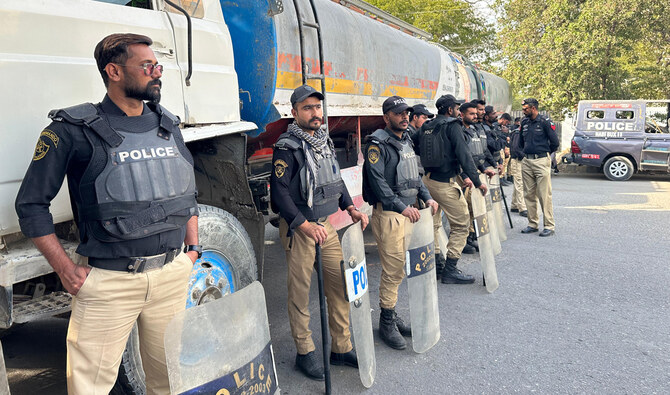KARACHI: Pakistan’s jailed former Prime Minister Imran Khan said on Saturday he has written another open letter to Chief of Army Staff General Asim Munir, complaining about the allegedly shrinking democratic space in the country since what he called “pre-poll rigging” in last year’s general elections, as his party marks a “Black Day” on the first anniversary of the electoral contest.
The letter is Khan’s second to the country’s powerful army chief this month. In the previous one, he had called for a reevaluation of current political policies while alleging that his party, Pakistan Tehreek-e-Insaf (PTI), was being targeted by the state.
Khan’s PTI and another opposition faction, Jamaat-e-Islami (JI), decided to stage protests today on the first anniversary of the last general elections. The PTI initially planned to hold a rally in Lahore but, after being denied permission by the local administration, relocated it to Swabi in Khyber Pakhtunkhwa, where the party is in power.
As protests continued in different cities, Khan warned in his letter of a widening rift between the army and the people.
“Using agencies for pre-poll rigging and manipulating election results to establish an orderly government, forcing a constitutional amendment through parliament under duress to subjugate the judiciary, recruiting handpicked judges, enforcing draconian laws like PECA [Prevention of Electronic Crimes Act] to suppress dissent, and involving state institutions in political engineering rather than their constitutional duties is not only hurting public sentiment but also deepening the divide between the people and the army,” he wrote.
“The army is a crucial institution of the country, but a few black sheep within it are harming the entire institution,” he added.
Khan also criticized state policies, saying that “Internet censorship and social media restrictions” was creating problems for the country.
He blamed “a handful of individuals” for undermining the public mandate, leading to economic instability that has pushed investors and skilled professionals to leave Pakistan.
“Economic instability is at its peak,” he said. “The growth rate is at zero, and investment in Pakistan is nearly nonexistent. Poverty and unemployment are soaring.”

Pakistan police stand guard near a red zone in Karachi on February 8, 2025, as opposition parties protest to mark anniversary of Pakistan national polls, which they say were rigged to benefit their opponents. (AN Photo)
Khan also accused the authorities of damaging the military’s reputation among the public, arguing that national security depended on a strong bond between the people and the armed forces.
“Our soldiers are sacrificing their lives for Pakistan,” he continued. “To succeed in the fight against terrorism, the nation must stand behind the army. But the establishment’s policies and illegal actions have only worsened the army’s reputation among the people.”
There has been no official response from the army or the government to Khan’s letter yet.
Meanwhile, in Karachi, a PTI protest at the Press Club failed to draw large crowds, with party leaders blaming heavy security restrictions.
“How can anyone come to the protest?” asked Khair-un-Nisa, PTI’s Women District Manager in Karachi. “All the roads leading to [the protest venue] have been blocked. Troops have been deployed. They have started the arrests. What kind of law is this?“
Another PTI office bearer described the situation as “very unfortunate.”
“Freedom of association is a basic and fundamental right ensured by the Constitution of Pakistan,” said Advocate Maqsood Alam, Vice President of PTI’s Karachi Division. “But look here. You can see that the people of Pakistan, the citizens of Pakistan, cannot raise their voice independently. They cannot protest according to the constitution.”
Arrests of Opposition Workers
Earlier, police arrested multiple opposition members ahead of planned protests by PTI and JI to observe February 8 as a “Black Day” to highlight alleged election irregularities.
Pakistan’s general election was marred by a mobile Internet shutdown and unusually delayed results. The elections resulted in a hung National Assembly, followed by weeks of opposition protests alleging vote fraud. The caretaker government and the Election Commission of Pakistan (ECP) have denied the charges, but the US House of Representatives and several European countries have called for an independent probe— an initiative Pakistan has so far rejected.
PTI candidates contested the elections as independents after the party was barred from running under its symbol. While they won the most seats, they fell short of a majority, allowing a coalition of rival parties, led by Prime Minister Shehbaz Sharif, to form the government.















